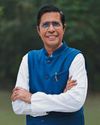
Twenty-six-year old Nikhil Tyagi, a digital marketer working in Delhi, says he never thought of investing in fixed deposits (FDs). He puts all his savings in stock markets and mutual funds (MFs), encouraged by the 29% returns he has earned so far.
Lucknow-based Rakesh Mishra (name changed), 55, does not invest more than 40% of his total savings in MFs and stocks and has a good amount of savings in FDs, public provident fund and other traditional instruments. However, in the last one year, he has withdrawn a substantial amount to invest in real estate, confident that it will give good returns in the long run.
Tyagi and Mishra mirror the sentiments of an increasing number of people who are willing to trade the safety of bank deposits and their low returns for more profitable, even if riskier, assets. They do not believe traditional investment instruments offered by India's banking sector can deliver the returns they want in the long run. However, for the banks, this public wisdom means a threat to their growth prospects-deposits are good sources of bank lending.
Not Quite Lucrative
At a time when inflation has been in the range of 5%-6%, average returns offered by banks on several instruments range from 3%-9%. On the other hand, stock markets are witnessing a prolonged bull run. Benchmark Nifty delivered over 20% returns in 2023. The number of demat accounts in the country has increased from four crore in April 2020 to 15.4 crore in April 2024.
The net financial savings of Indian households fell from 11.5% of GDP in 2020-21 to 5.1% of GDP in 2022-23. As per Reserve Bank of India (RBI) data for households, banks received Rs 12.4 lakh crore as deposits in 2020-21. This figure fell to Rs 10.2 lakh crore in 2022-23. At the same time, investment in MFs increased from Rs 64,000 crore in 2020-21 to Rs 1.7 lakh crore two years later.
Diese Geschichte stammt aus der June 2024-Ausgabe von Outlook Business.
Starten Sie Ihre 7-tägige kostenlose Testversion von Magzter GOLD, um auf Tausende kuratierte Premium-Storys sowie über 8.000 Zeitschriften und Zeitungen zuzugreifen.
Bereits Abonnent ? Anmelden
Diese Geschichte stammt aus der June 2024-Ausgabe von Outlook Business.
Starten Sie Ihre 7-tägige kostenlose Testversion von Magzter GOLD, um auf Tausende kuratierte Premium-Storys sowie über 8.000 Zeitschriften und Zeitungen zuzugreifen.
Bereits Abonnent? Anmelden

From Chandni Chowk to Global Recognition
For Manish Aggarwal, director at Bikano, Bikanervala Foods, the family business was not just a responsibility but a passion he took to the global stage

Spotting AI Scams
Al has become an integral part of our lives, from customer service no insurance claims. But it is also becoming a tool for fraudsters who use it to scam individuals and corporations

Let a Hundred Flowers Bloom
On the banks of the Ganges in industrial Kanpur, a start-up has blossomed that turns waste flowers into incense

BATTERY LOW
India produces enough green energy to power many of its largest cities yet lacks the storage to use it efficiently. A nation blazing forward must leap ahead in battery technology to stay on course

We Have Everything Going for Rajasthan
Rajyavardhan Singh Rathore, Rajasthan’s industry and commerce minister, tells Pushpita Dey why the state is suited to become a hub for investments.

Dairy and Other Dilemmas
India’s refusal to open its dairy market has complicated trade negotiations for years. As global partners demand concessions, is the cost of protectionism outweighing benefits?

Riding in a Maze
As gig workers ride into an uncertain future with little more than a smartphone and a bike, the government is struggling to arrange a socialsafety net. But millions without social security is recipe for disaster

BIRLA'S BIGGEST BATTLE
As Kumar Mangalam Birla completes 30 years at the helm of the Aditya Birla Group, he has a battle to defend his businesses and conquer new ones

THE INNOVATION LEAP
India dreams of becoming a product nation. But unless the corporate sector significantly increases spending on R&D, the country will continue to lag behind global peers

EDUCATION BUDGET MUST DOUBLE EVERY 3 YEARS
Veezhinathan Kamakoti, a renowned academic and director of Indian Institute of Technology Madras, tells Deepsekhar Choudhury on what technology sovereignty means for India and how it can propel the country towards its vision of becoming a developed nation by 2047.